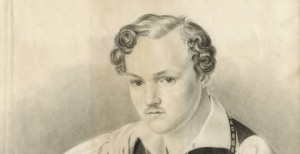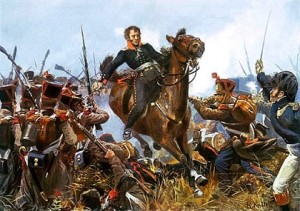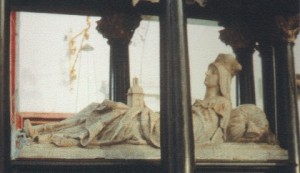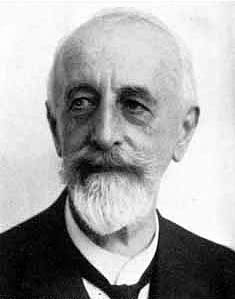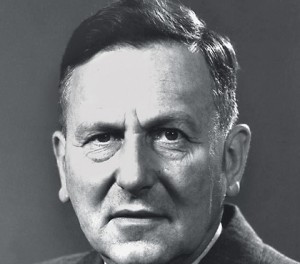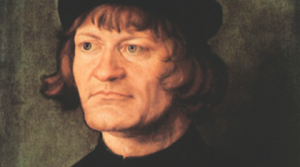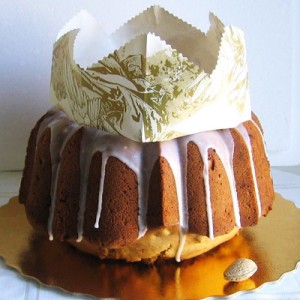October 17, 1707 Shortly after accepting a position as organist at St. Blasius's in Germany, composer Johann Sebastian Bach marries his second cousin, Maria Barbara Bach. The couple had seven children together, but only four survived to adulthood. October 17, 1778 Death of Johann Hummel in Weimar, Germany. The composer, Hummel, studied in … [Read more...]
October 16 in German History
October 16, 1708 Birth of the biologist Albrecht von Haller in Bern, Switzerland. He was a professor of medicine, anatomy, and surgery at the University of Göttingen. He was the first to understand the system of respiration. He demonstrated the function of nerves. His 8-volume Elementa Physiologiae Corporis Humani is a classic in medicine. … [Read more...]
October 15 in German History
October 15, Feast day of St. Pantalus (ca. 304 - ?). St. Pantalus is thought to have been the first bishop of Basel, Switzerland. Available documentation indicates that he was a Martyr. By the 12th century his story had become interwoven with the legends of St.Ursula. According to those legends he met St. Ursula on her return trip from Rome to … [Read more...]
October 14 in German History
October 14, 1806 The Prussian army is crushed by Napoleon at the Battle of Jena. October 14, 1871 Birth of Alexander Zemlinsky in Vienna, Austria. Zemlinsky was a composer and conductor. Arnold Schoenberg was his brother-in-law. He wrote 6 symphonies and 10 operas including, Eine florentinische Tragödie and Der Zwerg. October 14, … [Read more...]
October 13 in German History
October 13, 1694 Death of Samuel Freiherr von Pufendorf in Berlin (born in Dorfchemnitz, Saxony). Pufendorf encountered Descartes, Grotius and Thomas Hobbes while at Jena. He went on to become one of the developers of the concept of "natural law". Based on his first work on natural law, Elementorum Jurisprudentiae Universalis Libri Duo, a chair … [Read more...]
October 12 in German History
October 12, 1518 Having been called to the offices of Cardinal Thomas Cajetan, Martin Luther refuses to retreat from the positions taken in his 95 thesis on indulgences. The theses had been posted a year earlier on the door of the Hofkirche in Wittenberg. (The church still stands although the wooden doors are gone. They have been replaced with … [Read more...]
October 11 in German History
October 11, 1491 Death of Blessed Jakob Griesinger. Little is known of Jakob Griesinger, also known as Jakob von Ulm and as Alemannus. He was born in Ulm, Germany in 1407 and trained as a glass blower. He undertook a trip to the holy sites in Rome and on the return trip stooped to pray at the grave of St. Dominic. He then entered the Dominican … [Read more...]
Three Kings’ Cake
Three King's Cake (or bread) is closely allied with the traditions around the Epiphany (January 6th). This date commemorates the visit the Three Wise Men made to the baby Jesus in Bethlehem. Ingredients: Dough 3/4 cup light raisins 3/4 cup chopped dates 1 1/3 cups chopped walnuts 1/2 cup chopped dried apricots 1/2 cup chopped candied … [Read more...]
Stutenkerl
A Stutenkerl belongs to the Saint Nicholas tradition in the German-speaking countries. It is a pastry made of Stuten, sweet leavened dough, in the form of a man. Ingredients: 500 g (4.5 cups) flour, additional flour 1 package of active dry yeast 50 g (1/4 cup) of sugar pinch salt 250 ml (1 cup) warm milk 50 g (4 tbsp) of butter, melted … [Read more...]
Lebkuchen
They are world-famous and inseparably tied to Christmas – Nuremberg Lebkuchen or gingerbread. These internationally-known delicacies were first baked by Franconian monks, who created these sweet baked goods as early as the 14th century. Ingredients: For the cookies: 3 cups all-purpose flour, plus extra for kneading 1¼ teaspoons ground nutmeg 1¼ … [Read more...]
- « Previous Page
- 1
- …
- 52
- 53
- 54
- 55
- 56
- …
- 118
- Next Page »
